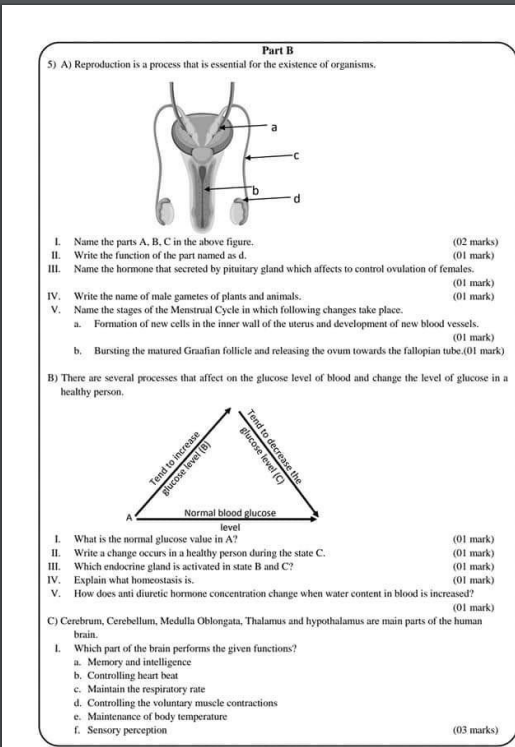A) Reproduction is a process that is essential for the existence of organisms. Name the parts A, B, C in the above figure. Write the function of the part named as D. Name the hormo... A) Reproduction is a process that is essential for the existence of organisms. Name the parts A, B, C in the above figure. Write the function of the part named as D. Name the hormone that is secreted by the pituitary gland which affects the control of ovulation in females. Write the name of male gametes of plants and animals. Name the stages of the menstrual cycle in which the following changes take place: a. Formation of new cells in the inner wall of the uterus and development of new blood vessels. b. Bursting the matured Graafian follicle and releasing the ovum towards the fallopian tube. B) There are several processes that affect the glucose level of blood and change the level of glucose in a healthy person. What is the normal glucose value in A? Write a change occurring in a healthy person during the state C. Which endocrine gland is activated in state B and C? Explain what homeostasis is. How does an increase in diuretic hormone concentration change when water content in blood is increased? C) Cerebrum, Cerebellum, Medulla Oblongata, Thalamus and hypothalamus are main parts of the human brain. Which part of the brain performs the given functions? a. Memory and intelligence. b. Controlling heart rate. c. Maintaining the respiratory rate. d. Maintenance of voluntary muscle contractions. e. Sensory perception.

Understand the Problem
The question is asking for information and detailed answers related to reproduction, glucose regulation, and the functions of different parts of the brain. It includes several parts, each requiring specific knowledge in biology.
Answer
LH affects ovulation; male gametes are pollen grains (plants) and sperm (animals). Formation in proliferative phase; release in ovulatory phase. Normal glucose: 70-100 mg/dL. Pancreas activated. Homeostasis: stable conditions. Increased water lowers diuretic hormone. Brain functions: cerebrum, cerebellum, medulla.
The hormone secreted by the pituitary gland affecting ovulation is luteinizing hormone (LH). Male gametes in plants are pollen grains and in animals are sperm. The stages are proliferative phase (a) and ovulatory phase (b). Normal glucose in A is 70-100 mg/dL; pancreas is activated in B and C. Homeostasis is maintaining stable internal conditions. High water content decreases diuretic hormone. Memory is in the cerebrum, heart rate in the medulla, respiration in the medulla, muscle contractions in the cerebellum, and touch perception in the cerebrum.
Answer for screen readers
The hormone secreted by the pituitary gland affecting ovulation is luteinizing hormone (LH). Male gametes in plants are pollen grains and in animals are sperm. The stages are proliferative phase (a) and ovulatory phase (b). Normal glucose in A is 70-100 mg/dL; pancreas is activated in B and C. Homeostasis is maintaining stable internal conditions. High water content decreases diuretic hormone. Memory is in the cerebrum, heart rate in the medulla, respiration in the medulla, muscle contractions in the cerebellum, and touch perception in the cerebrum.
More Information
LH is crucial for ovulating women and corresponds to sperm production in men. Gametes are key to reproduction. The proliferative and ovulatory phases are parts of the menstrual cycle. The cerebrum and medulla play primary roles in processing memory and regulating heart/respiratory rates.
Tips
Confusing stages of the menstrual cycle with other phases; ensure clarity between proliferative and ovulatory phases.
Sources
- Endocrine System & Glands (for Parents) | Nemours KidsHealth - kidshealth.org
- Hormonal Control of Human Reproduction – Concepts of Biology - opentextbc.ca
- Animal Reproductive Structures and Functions | Organismal Biology - organismalbio.biosci.gatech.edu
AI-generated content may contain errors. Please verify critical information